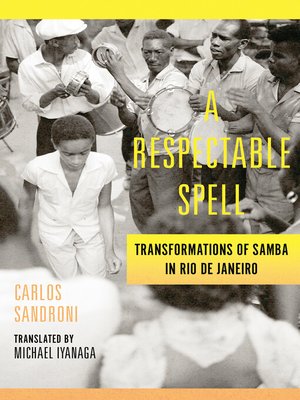
Sign up to save your library
With an OverDrive account, you can save your favorite libraries for at-a-glance information about availability. Find out more about OverDrive accounts.
Find this title in Libby, the library reading app by OverDrive.



Search for a digital library with this title
Title found at these libraries:
| Library Name | Distance |
|---|---|
| Loading... |
A landmark in Brazilian music scholarship, A Respectable Spell introduces English-speaking readers to the rich history of samba from its nineteenth century origins to its emergence as a distinctive genre in the 1930s. Merging storytelling with theory, Carlos Sandroni profiles performers, composers, and others while analyzing the complex ideologies their music can communicate in their lyrics and rhythms, and how the meaning of songs and musical genres can vary depending on social and historical context. He also delves into lundu, modinha, maxixe, and many other genres of Brazilian music; presents the little-heard voices and perspectives of marginalized Brazilians like the African-descended sambistas; and presents a study in step with the types of decolonial approaches to ethnomusicology that have since emerged, treating the people being studied not only as makers of music but also of knowledge.
"At long last, we can celebrate the publication of this groundbreaking study in English. Carlos Sandroni's brilliant 'historical ethnomusicology' of samba laid the foundations for many subsequent studies, and continues to set a standard in the field. Sandroni is equally adept at fine-grained musical analysis, rich social-historical contextualization, and crisp, clear explanation. Michael Iyanaga's sensitive and graceful translation makes this accessible to a broad international audience for the first time. This book is fundamental for all those interested in samba's emergence and evolution."—Bryan McCann, author of Hard Times in the Marvelous City: From Dictatorship to Democracy in the Favelas of Rio de Janeiro
|Carlos Sandroni is a professor of ethnomusicology in the Faculty of Music and the Faculty of Anthropology at the Federal University of Pernambuco (Recife). He was chairman of the Brazilian Association of Ethnomusicology from 2002 to 2004. His books include Mário contra Macunaíma: Cultura e política em Mário de Andrade. Michael Iyanaga is an assistant professor of music and Latin American studies at the College of William and Mary. His books include Desafios e particularidades da produção antropológica no Norte e Nordeste do Brasil.
Incisive and comprehensive, A Respectable Spell tells the compelling story of an iconic Brazilian musical genre.
| Cover Title Page Copyright Contents Translator's Foreword: The Decolonial Spark of a Translated Spell Acknowledgments Introduction to the English Translation Original Introduction Musical Premises Part One: From Lundu to Samba Chapter 1. "Sweet Lundus, for Massa to Dream" Chapter 2. Maxixe and Its Antecedents Chapter 3. From Bahia to Rio Chapter 4. From the Dining Room to the Drawing Room Chapter 5. "Pelo telefone" Part Two: From One Samba to the Other Chapter 6. When Did Samba Become Samba? Chapter 7. Birds and Commodities Chapter 8. From Malandro to Composer Chapter 9. A Respectable Spell Chapter 10. On the Gramophone Conclusion Glossary Notes Works Cited Index Back cover |"In A Respectable Spell, prominent Brazilian ethnomusicologist Carlos Sandroni contributes important perspectives by detailing the musical transformation of samba from the first recording in 1917 to its codification as a genre, circa 1930." —Journal of Folklore Research Reviews"At long last, we can celebrate the publication of this groundbreaking study in English. Carlos Sandroni's brilliant 'historical ethnomusicology' of samba laid the foundations for many subsequent studies, and continues to set a standard in the field. Sandroni is equally adept at fine-grained musical analysis, rich social-historical contextualization, and crisp, clear explanation. Michael Iyanaga's sensitive and graceful translation makes this accessible to a broad international audience for the first time. This book is fundamental for all those interested in samba's emergence and evolution."—Bryan McCann, author of Hard Times in the Marvelous City: From Dictatorship to Democracy in the Favelas of Rio de Janeiro
|Carlos Sandroni is a professor of ethnomusicology in the Faculty of Music and the Faculty of Anthropology at the Federal University of Pernambuco (Recife). He was chairman of the Brazilian Association of Ethnomusicology from 2002 to 2004. His books include Mário contra Macunaíma: Cultura e política em Mário de Andrade. Michael Iyanaga is an assistant professor of music and Latin American studies at the College of William and Mary. His books include Desafios e particularidades da produção antropológica no Norte e Nordeste do Brasil.







